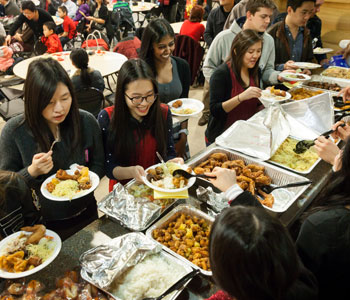Happy Chinese New Year
Vibrant lion dancers performed on stage to the beat of drums and cymbals, welcoming the “Year of the Horse,” during the opening act of Wake Forest’s Chinese New Year celebration. The event was hosted by Wake’s Asian Student Interest Association with support from the Office of Multicultural Affairs and the Chinese Student Scholars Association.
“The lions scare off evil,” said Martin Seng, a first-year student from Hong Kong. “The traditional dance shows the energy and vibrancy of our culture, and of the New Year celebration.”
Traditional Lion Dance
The Chinese New Year, also known as the Spring Festival, is an important holiday in Chinese culture. A different animal represents each year in the Chinese zodiac calendar. In 2014, the spirit of the horse embodies the goal of self-improvement. The horse is energetic, intelligent and warm-hearted. The year of the horse is thought to be a year that one is active in all endeavors, with hopes that you enjoy the company that surrounds you.
The Chinese New Year is a two-week affair that involves entire families. Diann Low, a first-year student from Winston-Salem, explained that older generations give the younger generations red envelopes with money. The red color represents good luck, fortune and happiness. Red envelopes, decorated with gold characters, were distributed at the campus celebration.
Red lanterns and traditional decorations, along with the smell of Chinese cuisine, filled the room. Numerous singing and karate performances reminded spectators of China’s rich culture. Members of the local community joined the Wake Forest community in the standing-room-only celebration.
Categories: Arts & Culture, Campus Life, Community Impact, Global Wake Forest, Happening at Wake
Media Contact
Wake Forest News
media@wfu.edu
336.758.5237




